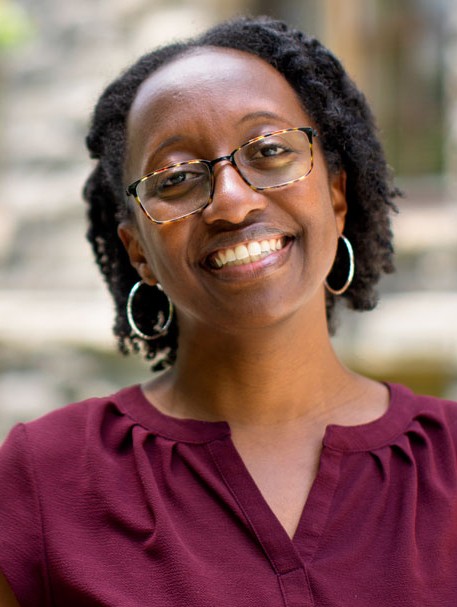Michener to direct new Center for Racial Justice and Equitable Futures
By Blaine Friedlander, Cornell Chronicle
Jamila Michener, associate professor of government in the College of Arts and Sciences and senior associate dean of public engagement at the Cornell Jeb E. Brooks School of Public Policy, has been named the inaugural director of the university’s new Center for Racial Justice and Equitable Futures.
The center will connect and amplify the university’s research and scholarship around issues of racial injustice and inequality, and its work to develop more just and equitable public policy.
“There is a tremendous breadth of scholarship across the university on issues of racism, indigeneity, ethnicity and bias,” President Martha E. Pollack said. “This new center, under Professor Michener’s leadership, will support and elevate that scholarship, advancing opportunities to break cycles of inequality and injustice.”
Michener will begin her new role in January 2024.
An internationally recognized leader in her field, Michener is also co-director of the Cornell Center for Health Equity and Cornell’s Politics of Race, Immigration, Class and Ethnicity (PRICE) initiative.
“There are advocacy and community organizations and government agencies working to advance racial justice in the world,” Michener said. “But what is Cornell’s place of comparative advantage? What can we contribute? Our critical resources are faculty and students. For the Center for Racial Justice and Equitable Futures, we can draw on the strength and brilliance of our faculty and on the passion and energy of our students to facilitate real progress in the face of the enduring challenges of racism.”
In July 2020, Pollack asked the Cornell Faculty Senate to develop a proposal for an academic research center to understand the systems and structures that perpetuate racism and inequality. On April 30, 2021, the Faculty Senate passed Resolution 163, which supported the creation of the Center for Racial Justice and Equitable Futures.
“Jamila’s leadership will quickly establish this center as a hub for research, education and teaching – advancing the understanding of how race has impacted law and policy, and thereby helping to shape our future,” Provost Michael I. Kotlikoff said.
Avery August, deputy provost, and Colleen Barry, dean of the Brooks School, co-chaired a national search for a director. They sought a candidate who could build an interdisciplinary community of faculty and students capable of generating and analyzing visions of ethical futures, as well as provide opportunities to forge new intellectual and social bonds.
“Jamila is really a star in her discipline,” said August, professor of microbiology and immunology in the College of Veterinary Medicine. “Her research is squarely in the center of where she’ll be working. She has many qualities that will help her build this center. Jamila is a natural leader. She’s a convener, which is an important quality for someone launching a new center and bringing together faculty from across different disciplines to achieve results toward a common goal. We couldn’t be more pleased that she’s agreed to take on this directorship.”
“Jamila is a leading national and international scholar in public policy and racial justice, and she cares deeply about public engagement to ensure that research can inform the political process,” Barry said. “Throughout her career, Jamila has focused on how research can positively affect people’s lives with a focus on the most vulnerable groups in our society. She is also a stellar teacher and deeply dedicated to training a next generation of research scholars working to create a more just, equitable world.”
Michener earned her bachelor’s degree at Princeton University in 2003, and her master’s degree (2006) and doctorate (2011), both in political science, from the University of Chicago. She was a Robert Wood Johnson Foundation Scholar from 2011 and joined the Cornell faculty in 2013.
Her interest in racial justice and equality stems from childhood, as her family moved from the Caribbean to Brooklyn and Queens in search of better economic opportunity.
“Growing up I lived in working class and low-income communities with a lot of immigrants of color, Black immigrants from the Caribbean, Latino immigrants from different parts of South America and Latin America – some of the most diverse places in the country,” Michener said. “Once I began college, learning about racial inequality helped me to understand my own life experiences growing up. I felt empowered as I began to develop an empirically rooted and deeply informed narrative about why things were the way they were in the world and in this country.”
Michener’s influence reaches beyond campus. Her 2018 book, “Fragmented Democracy: Medicaid, Federalism, and Unequal Politics,” on how the federal Medicaid and its policies affects democracy, won the 2019 Virginia Gray Best Book Award from the American Political Science Association and the 2019 PROSE Award for Excellence in Social Sciences Finalist from the Association of American Publishers.
In 2022, she testified before the U.S. House of Representatives about needed reforms to expand access to affordable health care and move the nation toward universal coverage. Last winter, at a White House “Evidence-to-Impact” collaborative event, Michener urged policymakers to consult with beneficiaries of government programs and services to learn from their experiences.
“I want to acknowledge that this is not an easy time to build a center to advance racial justice,” Michener said. “But precisely because this is a difficult time, it is a necessary time – when the world needs this most. This is exactly the right time. I’m looking forward to building this Center for Racial Justice and Equitable Futures and all it represents.”
Media Contact
Get Cornell news delivered right to your inbox.
Subscribe

